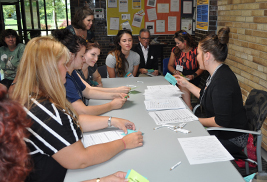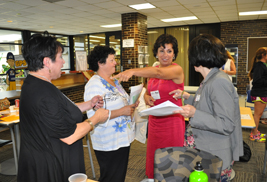Featured Article
Kent State Salem Students Participate in Poverty Simulation Exercise
For many who live above the poverty level, it is difficult to understand the emotional, social and economic impact poverty has on those who live in it every day.
read moreKent State Salem Students Participate in Poverty Simulation Exercise
Posted Aug. 26, 2013
Nursing students and staff members from Kent State
University at Salem participate in a poverty simulation to help
the community understand poverty. The interactive exercise
pictured above shows individuals at a social service agency.
The statistics proving that poverty exists in Columbiana County are alarming and staggering. Still, for many who live above the poverty level, it is difficult to understand the emotional, social and economic impact poverty has on those who live in it every day. The issue became quite real recently for about 40 nursing students and staff members from Kent State University at Salem who participated in a poverty simulation, an interactive exercise aimed at helping the community understand poverty.
Sondra O’Donnell, secretary in the nursing department, arranged for the simulation to take place at Kent State Salem. Aside from her duties at Kent State Salem, O’Donnell is actively involved with presenting the Bridges Out of Poverty educational series, and she works with individuals to coach them through their own trying situations.
“I think it’s important that we understand what’s going on around us,” she says. “As educators, we need to know that many of our students are coming from these situations and that we should be a resource of help for them. We have to show compassion for those who face serious issues outside of the classroom and appreciate their struggles. When our students enter the workforce, they will encounter co-workers, clients, patients and customers who are dealing with these same issues. This helps them get a different perspective on how others cope or handle these hardships.”
In the simulation, participants assumed the roles of members from several different families facing a variety of challenging, but typical, circumstances. Some were homeless, others were recently unemployed. Some were single-parent families; others were multiple generations living in one house. The roles included all ages: senior citizens, teens, babies, young children, young adults and middle-aged persons.
Also, volunteers from the Columbiana County Community Action Agency played the roles of resource providers, such as social workers, loan officers, employers, pawnbrokers, police officers, teachers, grocers and collection agents. One volunteer also assumed the role of a drug dealer.
The households represented families who encountered “situational poverty,” as well as those who were entrenched in “generational poverty.” Throughout the exercise, each family learned to survive its unique situation by securing food, shelter and other basic necessities, while adjusting to other situations that popped up: unplanned pregnancies, illness, crime, school closings, lack of transportation or just not knowing about available community services.
The simulation ended with a debriefing during which participants shared their experiences and what they learned about living in poverty. They expressed feeling frustrated, defeated, stressed and exhausted. Participants also shared how they learned to do whatever was needed to help the family survive, even if it meant stealing, selling drugs, dropping out of school, moving or selling personal belongings.
